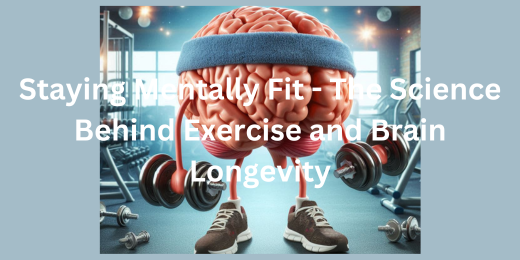
Staying Mentally Fit – The Science Behind Exercise and Brain Longevity
Exercise and brain health
The Brain Boost: How Exercise Promotes Cognitive Function
Regular physical activity significantly boosts cognitive function. Exercise and brain health are closely linked as it stimulates the growth of new brain cells and strengthens connections between existing ones. This leads to improved memory and enhanced learning capabilities, making it highly beneficial. This blog draws inspiration from an article featured on Medical News Today.
Focus and concentration can be greatly improved by exercise since it stimulates blood circulation to the brain. By improving overall mental clarity, individuals can perform better in various cognitive tasks. The benefits of exercise in this regard are substantial, providing a natural boost to brain function.
Physical activity also helps in reducing brain fog and fatigue. It lowers inflammation and modifies sleep patterns, both of which are essential for preserving mental clarity. These benefits of exercise ensure that the mind remains sharp and free from unnecessary mental fatigue.
Beyond the Gym: A Range of Exercises for Brain Health
Aerobic exercise is essential for brain health. Activities like brisk walking, running, swimming, or cycling get the heart rate up and improve blood flow to the brain. This connection between exercise and brain health enhances cognitive function and overall well-being.
Strength training also plays a crucial role in maintaining brain health. Building muscle mass can enhance cognitive function and improve balance, reducing the risk of falls. The benefits of exercise in this area are both physical and mental, promoting a healthier lifestyle.
Tai chi and yoga are two examples of balance activities that enhance coordination and awareness of space. These activities are beneficial for brain health, as they combine physical movement with mental focus. The benefits of exercise extend to mind-body exercises like dance, offering additional cognitive advantages.

Unveiling the Science: How Exercise Works at the Molecular Level
Exercise improves mitochondrial function, enhancing energy production and cellular repair throughout the body, including the brain. This positive effect on cellular health underscores the strong link between exercise and brain health. Overall health and cognitive performance are enhanced by improved mitochondrial function.
Physical activity influences gene regulation, turning on genes that promote brain health and turning off those linked to neurodegeneration. This dynamic change at the genetic level highlights significant benefits of exercise. Regular exercise thus supports long-term brain health and cognitive resilience.
Exercise regulates the immune system and reduces inflammation, which is crucial for brain health. This reduction in inflammation helps prevent conditions like dementia. The comprehensive benefits of exercise include enhanced immune response and protection against neurodegenerative diseases.
The Power of Youth: Exercise and Rejuvenating Brain Cells
Research indicates that exercise can rejuvenate microglia, the immune cells in the brain, by restoring their gene expression patterns to a youthful state. This highlights the significant link between exercise and brain health. Rejuvenated microglia support cognitive function and overall brain vitality.
In the hippocampus, a part of the brain essential for memory and learning, physical activity stimulates neurogenesis, or the formation of new neurons. This demonstrates the profound benefits of exercise for cognitive health. Regular exercise fosters brain plasticity, enhancing memory retention and learning capacity.
Exercise helps prevent the accumulation of harmful T cells in the hippocampus, which are associated with cognitive decline. This regulatory effect underscores the protective benefits of exercise. Retaining brain health and function requires continuing a regular physical activity regimen.
Sex and Exercise: Does Biology Play a Role?
Studies indicate there may be sex-based variations in how individuals respond to exercise at the cellular level. These differences can influence exercise and brain health outcomes, highlighting the need for personalised fitness strategies. Understanding these variations can optimise exercise benefits for all.
More research is required to fully understand the impact of biological sex on the benefits of exercise for brain health. Current findings suggest significant distinctions in cellular responses between males and females. Tailoring exercise programmes to these differences could enhance cognitive health for everyone.
Comprehensive studies could reveal crucial insights into how biological sex influences exercise and brain health. This knowledge would help develop better-targeted fitness regimes, maximising the benefits of exercise. Recognising these differences ensures that both men and women receive optimal brain health benefits from physical activity.
Optimizing Your Exercise Routine for a Healthy Brain
Finding the right exercise and brain health routine begins with choosing activities you enjoy. Consulting a healthcare professional ensures your routine is safe and effective. Building endurance and preventing injuries can be achieved by raising effort gradually at first.
A balanced approach includes aerobic, strength, balance, and mind-body exercises. This variety maximises benefits of exercise for brain health, enhancing cognitive function and overall well-being. Listening to your body and taking rest days when necessary promotes recovery and prevents overtraining.
By tailoring your exercise and brain health regimen to personal preferences and professional advice, you can optimise physical activity’s impact on cognitive function and mental clarity. Incorporating diverse exercises ensures holistic benefits, supporting long-term brain health and overall fitness goals.